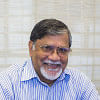
Ahrar Ahmad
Dr Ahrar Ahmad is professor emeritus at Black Hills State University in the US, and director general of Gyantapas Abdur Razzaq Foundation in Dhaka.
Dr Ahrar Ahmad is professor emeritus at Black Hills State University in the US, and director general of Gyantapas Abdur Razzaq Foundation in Dhaka.
The cruelties of the genocide, and the heroism of the resistance were all parts of the people’s lived experience.
An incredible opportunity has been created to build a more democratic, just and beautiful Bangladesh.
Even though transparent, participatory and competitive elections are a constitutional right, the realities today have vitiated those expectations.
A great university inspires and prepares students for a rich and fulfilling experience in a changing and challenging world.
Shorn of its sacred grandeur the Padma has embraced its secularised and earthier image with some muscularity, audacity and flair.
What makes a good student? A definitive answer to this question is difficult.
Today, the question of being a 'good teacher' generates a new vernacular.
On September 2, the student front of a political party announced its intention to form committees in 16 private universities. It was greeted with apprehension and alarm.
Under what authority can the police make such a demand and compel its acceptance?
If Marcellus saw the picture of college students brutalising an innocent man, he would surely have said to Hamlet that “something is rotten in the state of Denmark.
Prof Rehman Sobhan (RS) continues to amaze.
Badruddin Umar may not necessarily be a very popular person. That statement is a little ironic for two reasons. First, he is the pre-eminent “popular” (people’s) scholar and second, given his tastes and preferences, he would probably wear that judgement as a badge of honour.
Given the doubts, confusions and anxieties of the modern age, it is perhaps expected—and certainly obvious—that there is a resurgence of religiosity almost everywhere.
Bangladesh offers many important insights and perspectives in these grim and uncertain times. They indicate the uniqueness that defines us as a people, and the original contributions we are making to the world of politics and governance.
I am fortunate, indeed blessed, to have been a part of Dhaka University (DU) as a student and a teacher from 1967-75.
One of the grand paradoxes facing Bangladeshis is expressed in the negotiations and contestations on the simple question about who they are, particularly in the context of the strains caused by the Universalist claims of their religion on the one hand and the particularist demands of their ethnicity and culture on the other.
Bangladesh illustrates a most intriguing and delightful puzzle in international development. After its independence in 1971, it was dismissed